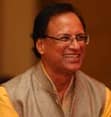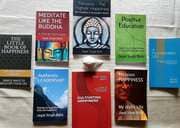Shri Jagat Singh Bisht
(Master Teacher: Happiness & Well-Being, Laughter Yoga Master Trainer, Author, Blogger, Educator, and Speaker.)
Authored six books on happiness: Cultivating Happiness, Nirvana – The Highest Happiness, Meditate Like the Buddha, Mission Happiness, A Flourishing Life, and The Little Book of Happiness. He served in a bank for thirty-five years and has been propagating happiness and well-being among people for the past twenty years. He is on a mission – Mission Happiness!
☆ Books by Shri Jagat Singh Bisht ☆
1. CULTIVATING HAPPINESS
A GUIDE TO PRACTICES THAT DO WONDERS:
LEARN PRACTICES TO FIND MEANING, PEACE AND WELL-BEING:
You can change your life if you have the right understanding and adopt proven practices for creating happiness.
This is a comprehensive guide on the art of living and the science of being, based on years of study and practical sessions.
It includes a step-by-step guide to twelve sets of exercises and a treasure trove of timeless wisdom.
The book is a unique confluence of positive psychology, laughter yoga, yoga, meditation, and spirituality.
It is the right place for beginners to take the first steps and for the advanced learners to add more skills to their repertoire.
You will experience cheerful health, authentic happiness, and everlasting peace once you adopt these practices.
2. MISSION HAPPINESS
My Idyllic Life:
This is a book on happiness, an autobiography, and a memoir that takes you for a journey on the pathway of authentic happiness, well-being, and a meaningful life. It gives you a new understanding of happiness and well-being and how to achieve them.
It takes a peek at my formative years, my work life, and my experiments with happiness. You will find, inside, a roadmap for a fruitful and fulfilling life, based on years of deep study and practical experience. It blends the best of positive psychology, meditation, yoga, laughter yoga, and spirituality.
The book will enable you to discover new ways to flourish in life, find inner peace, and contribute towards enhancing well-being on this planet. You will gain tremendous insight into life and happiness. The new learning, investigation, and wisdom can catapult you into higher realms of existence!
3. NIRVANA – THE HIGHEST HAPPINESS
BE A BUDDHA IN THE MODERN WORLD:
The Buddha taught the Dhamma – the law of nature, the path of truth -about two thousand and five hundred years ago.
A lot of time has since elapsed, and much water has flown down the rivers. The whole world has changed drastically but the guiding principles of spirituality remain the same.
The Buddha understood that this world is in turmoil. There is stress, misery, and pain all around. The human beings are suffering.
After a long struggle for enlightenment, he arrived at the root cause of all suffering, and discovered a path leading to liberation from suffering, to peace, to happiness.
This book helps you to understand Nirvana – the culmination of the quest for perfection and happiness – and takes you on the path leading to Enlightenment.
It presents the Buddha’s teachings in a crystalline form and acquaints you with the quintessence of the practice of meditation.
It takes you on the way to the end of suffering, pain, and distress.
If you are seeking a stress-free life, peace of mind, and spiritual wisdom, this book would be of immense benefit.
4. MEDITATE LIKE THE BUDDHA
A STEP-BY-STEP GUIDE:
This is essentially a book for beginning, establishing, strengthening, and consolidating your meditative practice. The instructions are simple and crystal clear.
It is a step-by-step guide for meditation based on practical experience. It explains in detail a universal practice of meditation thousands of years old. The Buddha attained enlightenment practising it and taught it to thousands of people for the next forty-five years. If you seek the serenity of the Buddha, you must learn to meditate like the Buddha.
Meditation calms the mind; removes anger, hatred, and ignorance; and develops love, compassion, and wisdom. It enables us to live our life optimally. Deep meditation leads to Nibbana – the state of supreme bliss, where you are free from all pain and suffering.
It includes supplementary reading material derived from the Pali Canon for gaining insight and spiritual development. This book is a treasure trove for all meditators.
5. THE LITTLE BOOK OF HAPPINESS
SIMPLE WAYS TO BEAUTIFY YOUR LIFE:
SIMPLE, HASSLE-FREE, AND DIY WAYS TO CREATE YOUR OWN HAPPINESS:
This book describes activities derived from the modern science of happiness as well as ancient spirituality, based on years of study and practical sessions with people.
You will learn about flow, work-happiness, mindfulness, laughter meditation, and happiness activities.
There are beautiful parables and inspirational quotes inside.
Experience new joy and freedom!
6. A FLOURISHING LIFE
EFFORTLESS PRACTICES FOR HAPPINESS AND STRESS MANAGEMENT:
Do you want to be happier? Would you like to increase your well-being and flourish? This book will help you flourish!
Flourishing is the experience of life going well – a combination of feeling good and functioning effectively. It is the opposite of languishing – living a life that feels hollow and empty.
Everyone seeks a flourishing life, but the modern-day lifestyle generates a lot of stress, which is the cause of psychosomatic disorders, including hypertension, respiratory ailments, gastrointestinal disturbances, migraine, and ulcers.
In this book, you will find simple, effortless, and painless practices for authentic happiness, stress management, and lasting peace. These exercises are easy to do, can be taken up by anyone, and require no previous training or experience.
The contents include how to relax your body and mind, knowing your inner self, freestyle exercise, life-long learning and evolving, autonomy and self-determination, flourishing, and spirituality.
After reading this book, you will have a deep understanding of the elements of authentic happiness and well-being. This book helps you to lead a flourishing life.
♥ ♥ ♥ ♥
© Jagat Singh Bisht
Master Teacher: Happiness & Well-Being, Laughter Yoga Master Trainer, Author, Blogger, Educator, and Speaker
FounderLifeSkills
A Pathway to Authentic Happiness, Well-Being & A Fulfilling Life! We teach skills to lead a healthy, happy and meaningful life.
The Science of Happiness (Positive Psychology), Meditation, Yoga, Spirituality and Laughter Yoga. We conduct talks, seminars, workshops, retreats and training.
≈ Editor – Shri Hemant Bawankar/Editor (English) – Captain Pravin Raghuvanshi, NM
















